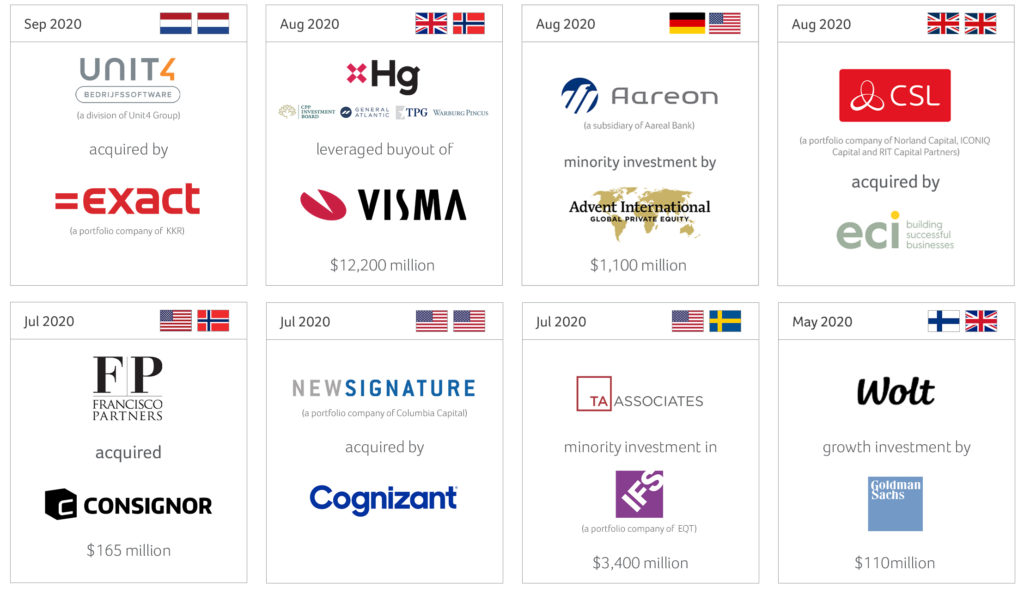In particular, investors sought out investment opportunities that would address the urgent needs presented by C19 to automate workflow, provide ubiquitous access to data and applications, as well as facilitate effective and efficient remote working. This focused considerable attention on the Software sector and, specifically, SaaS, with the workflow criticality and operational benefits of SaaS solutions providing strong momentum to the sector. In addition, a highly “sticky” revenue model based upon annual subscriptions with compelling forward earnings visibility enables investors to pursue opportunities with a high degree of confidence and conviction. Strong investor appetite saw valuations for publicly traded SaaS companies surge from approximately 10 times run-rate revenues in early 2020 to over 15 times by the second half of the year. In addition to Visma, IFS and Aareon – valued in aggregate at $17 billion – Arma also advised on multiple SaaS and software transactions including Corilus, Consignor, CoreHR and EcoOnline.
The push for automation, the growing need to manage securely large data sets and the underlying demand for high bandwidth connectivity to data and applications have been accelerated by C19 and caused a surge in the adoption of public cloud services. Sharply increased utilisation of cloud computing and storage has also been driven in part by cloud-based conferencing, telephony, messaging as well as greater intensity of consumption of streaming media services, social media and online commerce. Gartner predicts that public cloud services will grow 20% during 2020 to a total market value in excess of $330 billion. Arma successfully advised on several cloud services and communications transactions in 2020 including the sales of: M2M/IoT connectivity solutions provider CSL to ECI; public cloud transformation specialist NewSignature to Cognizant; and cloud-based telematics service provider Mobiliz to GPS Bulgaria.
The effects of C19 have also had far-reaching consequences for the consumer economy. Valuation increases of Internet companies such as Alphabet, Amazon, Facebook and Netflix have been underpinned by a significant uptick in both consumers’ propensity to consume content through on-demand services, including critically education and e-learning, and to undertake more eCommerce. This was highlighted by Tencent’s investment in French hyper-casual games business Voodoo in August 2020, which valued the company at $1.4 billion. Other beneficiaries of C19-induced lockdowns have included online media and food delivery companies, as a broader array of eCommerce vendors have seen swathes of new customers migrating online. Several large transactions were announced during 2020, including KKR’s $10 billion acquisition of Axel Springer and Adevinta’s $9 billion acquisition of Ebay’s European online classifieds operations, which accounted for a large portion of $26 billion media and Internet deal value during the period, which was down 30% versus the comparable period in 2019. Arma has successfully advised on growth financing transactions for Nordic food delivery champion Wolt, amounting to $240 million, as well as leading re-commerce platform Swappie, illustrating strong continuing investor appetite for the sector.
Finally, the rapid transformation of financial markets, financial services and payments via the adoption of technology has continued throughout the pandemic. The volume of sizable deal activity in fintech increased during the pandemic, while aggregate deal value remained largely stable. C19 has had a positive impact on several parts of the fintech ecosystem, notably accelerating the shift to automation and digital transformation by financial institutions, hastening the shift from cash to card based payments and the need for a seamless, omni-channel buying experience. This trend was evidenced by Arma’s role advising Lydia, a leading European mobile financial services platform, on its growth investment by Tencent, one of Asia’s pre-eminent technology and Internet groups. Meanwhile, financial sponsor interest in the sector has remained robust, underpinning Arma’s highly successful sale of leading fintech company smartTrade.




